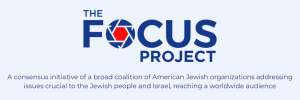
July 8, 2025
STAY INFORMED – TALKING POINTS – ACTIONS TO CONSIDER – STORIES MAKING NEWS
![]()

As Israel’s prime minister visits the White House, Jews across America and around the world continue to face physical attacks and cultural exclusion. President Trump is optimistic that Benjamin Netanyahu’s government and the Palestinian terrorist organization Hamas can reach a new ceasefire deal. The proposed 60-day truce reportedly would see Israel release many convicted terrorists in exchange for 10 of the remaining 20 living hostages and the bodies of others. There are 50 total hostages still in Gaza. Israel also would pull back its forces and allow more aid to enter Gaza – with Hamas remaining in power.
At the same time, violent rhetoric and attacks against Jews is growing. From Colorado Springs to London and from Melbourne to NYC, the line between protest and provocation grows thinner and the cost of normalized hatred is becoming harder to ignore.
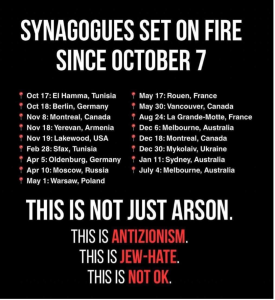
Enduring Hostage Crisis: ‘Every mother worries about her child’
Nearly two years after Iran-backed Hamas carried out its brutal Oct. 7 massacre, the agonizing condition of Israeli hostages remains an unbearable burden for their families – and for Israelis and Jews around the world. Recently, three hostages’ families agreed to release the Hamas propaganda videos of their children held in captivity.
Anat Angrest described the agony she feels for her son, Matan: “Every mother knows from the first cry of a baby, we are worried about our children.” She is concerned that her son – a 23-year-old soldier – is suffering from untreated burns and chronic asthma, according to the testimonies of other hostages held with her son. Hamas does not respect international prisoner-of-war laws for humane treatment.
Matan Angrest has been reportedly tortured with car batteries and electric paddles until losing consciousness – and may be permanently disabled. The other hostages still held in captivity are all enduring incomprehensible pain. Hostages are suffering from a number of illnesses, including: Matan Zangauker, 25, muscular dystrophy; Segev Kalfon, 27, PTSD; and Eitan Horn, 37, chronic illness.
Bar Kuperstein, 23, was abducted from the Nova music festival while providing first aid to the injured – he served as an army combat medic. His dad, Tal, has worked with a speech therapist following a stroke in an effort to regain his ability to speak so he could advocate for his son’s release. He was shown with Maxim Herkin pleading for their lives: “We are dying here with a pulse, we don’t feel human. We are dead men walking.” Herkin, now 37, is a loving father to his 3-year-old daughter, Monica. He was studying computer science while working to support his family when he was kidnapped from Nova.
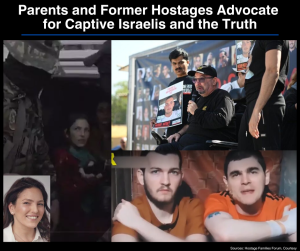
Oct. 7: ‘Hamas used sexual violence as a tactical weapon of war’
A new report excruciatingly details the sexual atrocities committed by Hamas terrorists – who murdered more than 1,200 Israelis on Oct. 7, 2023. There had been a lack of first-hand accounts because while the sexual violence was “widespread and systematic” most victims were “permanently silenced” – murdered or too traumatized to talk.
The Dinah Project – named after the first rape victim in the Bible – adds new evidence from 15 returned hostages who experienced sexual violence in captivity. The project’s goal is “to be a voice for those who cannot speak and to counter denial, misinformation and global silence – especially the grave failure of international human rights groups.”
The report and investigators stated that “clear patterns emerged in how the sexual violence was perpetrated, including victims found partially or fully naked with their hands tied – often to trees or poles – evidence of gang rapes followed by execution and genital mutilation. Sexual violence continued in captivity, with many returnees reporting forced nudity, physical and verbal sexual harassment, sexual assaults and threats of forced marriage. Some hostages had to strip and shower while being watched.”
The sexual violence experts also interviewed Oct. 7 survivors and first responders. They “described dozens of cases of sexual violence – including rape and gang rape – that took place in multiple locations. Women were found dead, naked and mutilated – with gunshots in their genitalia – and tied to trees. Many of the witnesses spoke of the victims being shot and Palestinian terrorists still trying to rape a dead body. The patterns are proof this was premeditated. Sexual violence in conflict is about destruction and dehumanizing a community.”
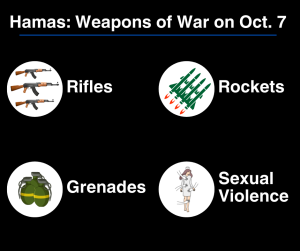
From Rhetoric to Real-World Violence: ‘Globalize the Intifada’
A dangerous worldwide trend is becoming more virulent: the escalating normalization of rhetoric that directly incites violence against Jews, Zionists and Israelis. In NYC, mayoral candidate Zohran Mamdani repeatedly refused to condemn the chilling slogan “Globalize the Intifada.” During the Second Intifada – launched by Palestinian Authority President Yasser Arafat in 2000 – Palestinian terrorists attacked Israeli busses, restaurants and other targets – killing more than 1,000 Israelis.
When NYC voters were asked: “Mamdani backs the Boycott, Divestment and Sanctions Movement against Israel and also refuses to condemn the phrase ‘Globalize the Intifada,’ which some interpret as a call to violence against Jews. Does knowing this make you more or less likely to vote for Mamdani?” While a slight majority responded that they were less likely to vote for him – 31% were more likely to support Mamdani. This number rises to 46% among 18- to 44-year-olds.
The latest arson attack against Jewish worshippers in a synagogue struck Australia – again. The attacker poured and lit flammable liquid on front doors – the second firebombing in Melbourne in seven months. The 20 worshippers inside for a Shabbat meal were unharmed. There have been a number of firebombing attacks on synagogues during the past few years, including in America, Armenia, Canada, France, Germany, Poland, Tunisia and Ukraine.
About a mile away from the Melbourne synagogue, anti-Israel protesters stormed an Israeli restaurant. About 20 individuals chanted, “Death, death to the IDF” – echoing the calls from the lead singer of the Bob Vylan band from the prior week’s UK music festival – and threw chairs and knocked over tables terrifying diners.
Zionist Federation of Australia President Jeremy Leibler responded: “We’re starting to see outright calls for the death and murder of Jews become normalized on Melbourne’s streets. There has been a transition from coded slogans like ‘From the river to the sea’ and ‘Globalize the intifada’ to explicit incitement with the chant ‘Death to the IDF.” Executive Council of Australian Jewry co-CEO Alex Ryvchin, added: “Those who chant for death are not peace activists. Those who would burn houses of prayer with families inside do not seek an end to war.”
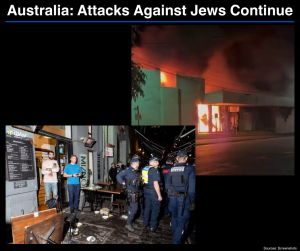
![]()

![]()

Jewish safety, dignity and truth require moral clarity and public pressure …
![]()

The Meaning of the Anti-Jewish Slur “Shylock”
President Trump recently described some bankers as “Shylocks.” Then-VP Biden also used the slur in 2014 and then apologized. The term “Shylock” comes from a character in Shakespeare’s The Merchant of Venice, where the Jewish moneylender is portrayed as greedy, vengeful and obsessed with extracting a literal “pound of flesh” from a debtor. For centuries, the character has fueled antisemitic stereotypes that associate Jews with financial manipulation, cruelty and moral depravity. Referring to Jews – or even bankers more broadly – as “Shylocks” evokes this long history of dehumanization and financial libel, making it a slur that is deeply offensive to Jews.
Stories Impacting American Jews
Stories Impacting the U.S. and Israel
Stories From Around the World
Stay Informed | Speak Up | Take Action
Want to Read More of Our Talking Points? Did you miss a recent edition of The Focus Project? No need to search your inbox. Our most recently published editions are available on our website.
![]()

This content is developed by The Focus Project in partnership with MERCAZ USA. The Focus Project distributes weekly news and talking points on timely issues concerning Israel and the Jewish people, including antisemitism, anti-Zionism and the delegitimization of Israel. It represents a consensus view across a spectrum of major American Jewish organizations. MERCAZ USA recognizes and respects the diversity of views on these issues among its readers and the community at large.
![]()